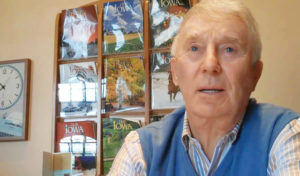
Let’s talk about one of my dumbest weaknesses: the fear of asking for help.
It’s dumb but it’s also interesting because it has lots to do with power and politics.
Let’s start with an obvious observation: This phobia is primarily a male thing. Most of the men I know have it. Most women I’ve known don’t even understand it.
Like most men, I don’t even like to ask directions when I’m in an unfamiliar neighborhood. I’d rather drive around aimlessly until I happen to hit on the right way. Asking directions makes me feel submissive. And I don’t like to feel submissive because I live in a world where submitting is a disadvantage.
When you submit, you relinquish power. And power, in the competitive, male-dominated business world, is the most valuable currency.
A good resource on this subject is Deborah Tanner. She’s a psychologist who writes about how men and women communicate. Her books have titles like Why What I Said You Didn’t Listen to Because What You Said I Already Said Yesterday. I would be interested to hear what she has to say about asking for help. I’d bet she’d agree with me.
If you are a woman in business, you may not recognize that asking questions about what you’re doing is a double-bladed proposition. On the one hand, it may endear you to the men you work with because they will like the implicit flattery. On the other hand, the asking itself is an indication (to the “male” psyche) that you are at least momentarily willing to play a submissive role.
Put differently, you should recognize that each time you ask a question you may be giving away a little bit of power. If you ask enough questions, you risk giving up the standing you’ve worked so long to achieve.
I am speaking in broad strokes to make a point. There are questions that do not yield power. And there are times when you will give a little (by asking a submissive question) in order to give a man the power he needs. But to ask questions without realizing the effect is to put yourself in an unnecessarily weak position.
I’m working my way through this as I write. It’s not something I’ve already figured out. So bear with me if I move back and forth a bit.
Questioning Your Power… Powering Your Questions
We are talking about power, generally. And about how men deal with it, specifically.
Contrary to what some would have you believe, most men are not brutes that think simply and mostly with their penises. They can be (and usually are, in business situations at least) subtle and sophisticated creatures. This is certainly true when it comes to passing around power. It’s not just about grabbing and pushing. It’s not King of the Mountain.
It is not stretching the truth to say that most men want as much power as they can get. (This could be said of women too, but that’s for another essay.) But because men have long been the primary brokers of power, they have learned that it is difficult, if not impossible, to simply grab power as they go. They realize that they are competing in an arena where thousands, if not millions, of other men are doing the same thing.
When two competitive men meet for the first time, they rarely launch into head butting to see who is dominant. Instead, they engage in a “feeling out” discussion.
They are primarily interested in discovering each other’s strengths and weaknesses in many different areas: raw intelligence, emotional intelligence, analytic skills, speaking ability, charisma, humor, and, of course, money and toys and famous friends.
Like boxers in the first round, men will verbally jab and shift, feinting and parrying, trying to discover who is the better (a) businessman, (b) moneymaker, (c) athlete, (d) intellect, (e) talker, (f) comedian, etc. Their questions will be so casual (almost to the point of being banal) that a woman listening in might think nothing is being communicated at all.
 MarkFord
MarkFord





